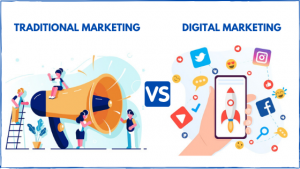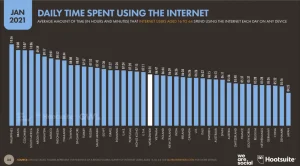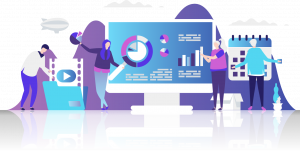Digital Marketing Services versus Traditional Marketing Activities

Over the past decade, there has been many digital marketing solutions from social media marketing to SEO marketing. We’re all told that digital is better and more cost-effective than putting up a billboard on the highway, but how do we know? We’ll take a deep dive into the cost and value of digital marketing services.
What is Digital Marketing?
Digital marketing is advertising via online channels using web based technology to deliver promotional or marketing content. It can be helpful to think of it as the most recent generation of marketing.
Should Businesses Go Digital?
To be perfectly honest: businesses can no longer ignore digital marketing. It is the future, whether you like it or not. Since the pandemic lockdown, we saw a significant increase screen time globally. In South East Asia alone, the region saw a screen time increase of 9.9% and users grew to 463 million people. Culture has been evolving. Over 72% of Asian-Pacific Internet users are researching products online before purchasing.

In traditional marketing, you show customers what your product can do for them: a car that will get you to your job faster, a house that will protect you from the elements, or a pill that can cure all your ailments. On digital, you sell your customers the ability to solve their own problems.
The difference between marketing a product and marketing a service is that with products, you are selling the solution to your customer’s problem. With services, you’re selling the customer the pleasure of solving the problem themselves.
And in the digital world, that difference has shrunk. The Internet has blurred the distinction between marketing and selling. With the Internet, there is no product to sell: there is just an idea.
The digital world has changed how customers shop. When they want a product, they go to the store. When they want service, they go online. Traditional marketing has emphasised product over service, because it’s easier to show customers what products can do than what they can enjoy. Now, though, customers go online to find a service, not a product.
With a product, the customer is passive: you control what they do with your product. But with service, the customer is in control: they can buy, read, watch, or listen to whatever they want.
Digital marketing is the art of turning the customer into an active participant, using all the tools available to do things for you. This raises obvious ethical issues. If the customer can do whatever they want with your product, will you come to regret selling that product? Will customers be able to find a way to use your product in a way you never imagined?
And so far, customers have shown a willingness to put up with the risk. Even for services, you have to sell the idea of the service, not the service itself.
Digital Marketing Solutions
When Facebook and Google came into the picture, they democratised the cost of advertising. Small businesses that could not afford newspaper ads, are now able to advertise with a small cost. It has provided equal starting ground for all businesses.
It provides more tangible results to business owners and marketers: we are able to track how much revenue a piece of Paid Ad delivers to the business. Gone are the days of marketing being seen as just a place to push out information. Marketing is now seen as the place to drive revenue. Marketing is Sales, and Sales is Marketing. This transition is being driven in no small part by the rise of digital marketing and the way digital marketing data can be used.
In traditional marketing, businesses face a fundamental problem: Marketing was driven by creative people, and these people are driven by the creative process. Marketers process is to come up with great ideas and then execute them, sometimes with the help of others.
The problem with this process is that ideas are almost always driven by what marketers think customers want. The problem is that customers rarely have the same ideas, and marketers tend to assume that customers’ viewpoints match their own. Marketers are good at coming up with ideas, but bad at listening to customers. Marketers are good at executing ideas, but bad at tracking which ideas are working and which are not.
Digital marketing, in contrast, is driven by data. Digital marketing is built on the idea of accurately tracking what customers are doing, how they behave, and what they are buying. Instead of coming up with an idea and then executing it, digital marketing is based on tracking what customers are doing and then executing the idea based on what they have been doing.
Digital marketing starts with data. Data looks at what customers are doing, and data looks at how different types of customers are behaving. It then uses this data to determine where customers fit best, and then uses it to create targeted marketing messages. Digital marketing takes the time to get data, as opposed to just coming up with an idea and running with it. Digital marketing also tracks what customers are doing, and how different types of customers respond to marketing messages. It then uses this tracking data to determine where customers fit best, and then uses it to improve and optimise better business strategies – in short, digital made marketing smarter.
At the end of the day, digital marketing is here to stay. It’s will only continue to grow as time goes on and technology improves. And because digital marketing presents such a wide range of communication opportunities, it can be used by any business or organization—no matter how big or small—to reach their target audience and advance their marketing goals. The key takeaway from all this should be that if your brand wants to succeed in today’s digital age, it needs to incorporate digital marketing into its communication strategies.
Of course, with the many digital marketing services and the ever-changing technological landscape, it can get confusing to find the right strategies for your business. If you’re looking for an innovative team with years of experience under its belt, we’re here to help. It’s likely that our team has seen what you’re facing and can deliver the perfect solution—whether your project is large or small, digital or traditional, or something else entirely.


